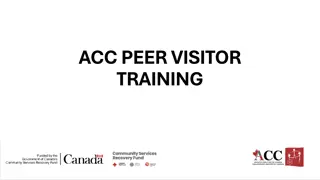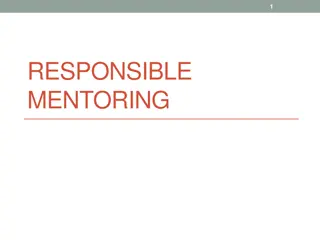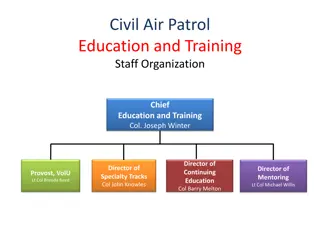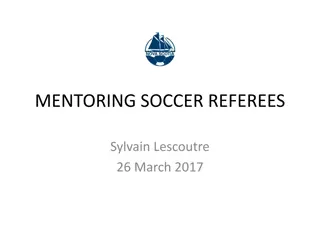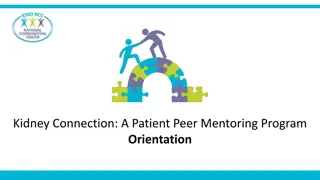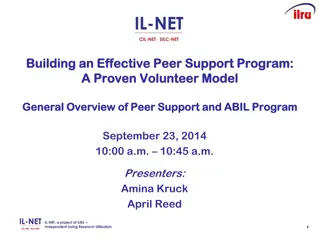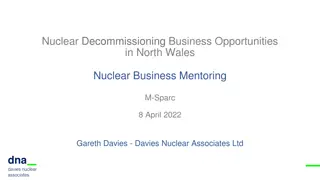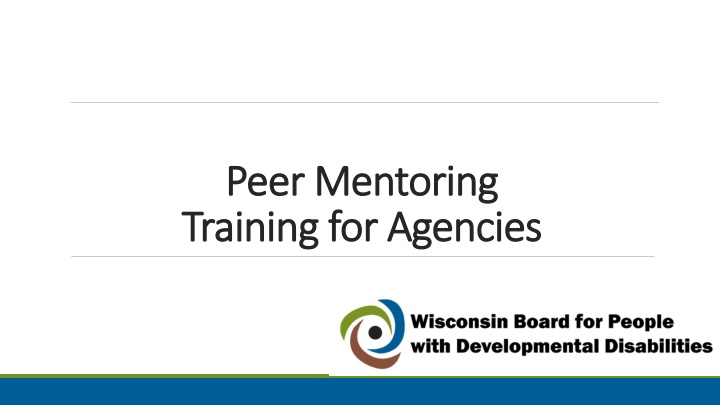
Effective Peer Mentoring Training for Agencies: Role, Competencies & Responsibilities
Enhance your understanding of peer mentoring with this training program focusing on defining peer mentor roles, outlining responsibilities, and providing valuable tips on giving constructive feedback. Explore the competencies required, the role of a peer mentor, and how they can support individuals in building independent lives through person-centered planning. Gain insights into empowering individuals, maintaining confidentiality, and educating about rights.
Download Presentation

Please find below an Image/Link to download the presentation.
The content on the website is provided AS IS for your information and personal use only. It may not be sold, licensed, or shared on other websites without obtaining consent from the author. If you encounter any issues during the download, it is possible that the publisher has removed the file from their server.
You are allowed to download the files provided on this website for personal or commercial use, subject to the condition that they are used lawfully. All files are the property of their respective owners.
The content on the website is provided AS IS for your information and personal use only. It may not be sold, licensed, or shared on other websites without obtaining consent from the author.
E N D
Presentation Transcript
Peer Mentoring Peer Mentoring Training for Agencies Training for Agencies
Objectives: Objectives: 1. Define role and competencies of Peer Mentor 2. Explain Peer Mentor internship process 3. Outline MCO, Agency (Employer) & BPDD responsibilities 4. Review Peer Mentor service & internship Forms 5. Provide tips on giving constructive feedback 6. Review pilot timeline and evaluation forms
1. Role & Competencies of a Peer 1. Role & Competencies of a Peer Mentor Mentor
Definition of Peer Mentor Definition of Peer Mentor A person with a developmental disability who has learned problem solving strategies, how to live a self-determined life, how to be a self-advocate, and knows how to access services and resources in the community.
Peer Mentor Role Peer Mentor Role Provide supports through the benefits of shared experiences Encourage and support others to take control of their lives and bring about the changes they want Assist with person-centered planning Build bridges to people and resources within their communities Decrease isolation and loneliness 5
Peer Mentor Competencies Peer Mentor Competencies Assists others in building their own independent lives Supports person-centered planning goals determined by the individual Works as a collaborator rather than an overseer Listens and builds rapport with people Runs on empathy, not sympathy
Peer Mentor Competencies Peer Mentor Competencies Helps people help themselves Supports self-direction by empowering people to make decisions about their services (and who provides them) Keeps all information about their peer confidential Educates individuals about their rights
Peer Mentor Competencies Peer Mentor Competencies Builds bridges to people and resources within the community Builds/includes Circles of Support by involving friends, family, service providers, etc. Uses People First Language Does not refer to non-disabled people as normal Always asks before helping 8
Peer Mentors Differ from Staff & Counselors Peer Mentors Differ from Staff & Counselors They do not tell their peer how to live their life They offer the benefit of their own experiences They are there for encouragement and support They support people to be their own self-advocate 9
10 Peer Mentoring is not: Peer Mentoring is not: A gripe session About the Peer Mentor being an expert A quick fix progress takes time Being a rescuer or a mommy Professional counseling or therapy A substitute for meaningful social and other support services
Code of Ethics for Peer Mentors Code of Ethics for Peer Mentors Peer Mentors are committed to facilitating personal, social, and economic independence for people with disabilities. Peer Mentors recognize the importance of this Code of Ethics and will uphold these standards. 11
Code of Ethics for Peer Mentors Code of Ethics for Peer Mentors Peer Mentors help people with disabilities advocate for their own needs, wants, and goals. Peer Mentors will be guided by the principle of self- determination for all. 12
Code of Ethics for Peer Mentors Code of Ethics for Peer Mentors Peer Mentors will, at all times, respect the rights and dignity of those they serve. Peer Mentors will respect the privacy and confidentiality of those they serve. 13
Code of Ethics for Peer Mentors Code of Ethics for Peer Mentors Peer Mentors will not accept gifts of significant value from those they serve. (In training, Peer Mentors are advised to check with their employer for specific policies and limitations). Peer Mentors will never engage in sexual or intimate activities with those they serve. 14
2. The Internship 2. The Internship Process Process
Overall Overall Process to Become a Certified Process to Become a Certified Peer Mentor Peer Mentor Complete Forms & Evaluation Tools Internship (90 hours) Exit Certification Interview
Peer Mentor Requirements Peer Mentor Requirements At least 18 years of age Have an intellectual/developmental disability Attend WI BPDD s Peer Mentor 101 training Complete a 90-hour internship with a service provider. Participate in annual continuing education trainings to maintain skills and expand knowledge base
90 90 Internship Hours Internship Hours Shadowing (agency staff and certified peer mentors) Learning the long-term care system & community resources Attending required agency trainings/orientation Attending any relevant staff meetings and trainings Attending peer trainings & conferences Monthly Peer Mentor teleconference calls Annual Peer Conference Annual Peer Mentor Retreat Mentoring one-on-one Mentoring in a group setting Co-facilitating groups Other work duties related to mentoring 50% of internship hours must be face-to-face mentoring
Ser Services Peer Mentors vices Peer Mentors M May Provide ay Provide Connecting to resources Guidance to find a volunteer opportunity Guidance to build job skills, explore or find a community job Guidance for independent living and moving toward independence Navigating transportation systems Help connecting to recreation and community participation Person-centered planning support Support to develop self-determination and self-advocacy skills
The Peer Mentor wants to succeed. The Peer Mentor understands their responsibility and role as an employee of your agency. Successful Peer Successful Peer Mentoring Mentoring The supervisor sees the Peer Mentor as an employee and not as a person that is served. The employer shows they value having a Peer Mentor to provide services. Everyone understands that Peer Mentoring is designed to be one of the tools to help people live self-determined lives.
Be familiar with role and competencies of Peer Mentor Identify opportunities to involve a Peer Mentor Assist in matching a Peer Mentor with others based on same interests Promote Peer Mentoring Accept Peer Mentors as a partners Help identify Peer Mentor s strengths Demonstrate/model problem solving skills Demonstrate/model communication skills What agencies can do to foster successful Peer Mentor internship and program
3. MCO, Agency (Employer) 3. MCO, Agency (Employer) & BPDD Responsibilities & BPDD Responsibilities
Managed Care Organization Role Managed Care Organization Role Identify a pathway for agencies to bill for Peer Mentoring services. Use a consistent rate structure with all providers during the pilot with the option to test two approaches = Hourly and 15 minutes increments. Work with pilot sites to identify potential mentees. Collaborate with BPDD to train IDT staff on benefits of Peer Mentoring. 23
Managed Care Organization Role Managed Care Organization Role Expedite the RAD and service authorization process during pilot phase. Support this process moving forward after the pilot phase. Execute a limited term contract (until Peer Mentoring is added to FC waiver) with pilot agencies to continue to provide Peer Mentoring services. Participate in monthly collaborative conversations on the development of long-term service, quality standards, rates, etc.
Agency (Employer) Role Agency (Employer) Role Execute a contract with MCO for Peer Mentoring services. Assure all training, documentation, and other contract requirements are met for this service. Identify the Peer Mentor Supervisor who is responsible for the success of the Peer Mentor. Hire Peer Mentor before beginning the internship. Notify BPDD of internship start date.
Agency (Employer) Role Agency (Employer) Role The agency is not responsible for service-related needs due to the persons disability as the employer (example: personal care, transportation, job coaching) The agency may provide disability related assistance which could include personal care transportation and job coaching. Provide supervision and support during the paid internship. Ensure typical employer responsibilities are upheld including training, supervision and support, scheduling support, contract requirements including but not limited to background checks.
Agency (Employer) Role Agency (Employer) Role Bill MCO for Peer Mentoring services. Support the Peer Mentor with ongoing training requirements and assure they are up-to-date. Work with MCO to recruit mentees - focusing on ages 12-26. (At least 20 people total across the 3 agencies for the pilot) Create a process to match Peer Mentor(s) with mentees.
Agency (Employer) Role Agency (Employer) Role Participate in monthly collaborative meetings during the pilot with BPDD, MCO s and agencies. Conduct Peer Mentor performance evaluation surveys with mentees at end of internship period - provide documentation to BPDD. Complete Peer Mentor performance evaluation at end of internship period - provide documentation to BPDD. Decide with BPDD and Peer Mentor if mentor has passed internship phase and is ready for provide Peer Mentoring services.
Intern Training Discussion: Intern Training Discussion: How long should intern supervisors attend meetings with mentees during an initial training period? (Share Michigan example) Should we agree on a minimum time period? For example, the supervisor attends the first two meetings with each intern and mentee. Or, the supervisor attends all meetings the intern has with mentees for two weeks.
BPDD Role BPDD Role Provide technical assistance to the agencies and Peer Mentors. Facilitate monthly meetings/trainings for Peer Mentors. Participate in evaluation of the Peer Mentors and provide periodic feedback toward progress. Conduct exit interviews with Peer Mentors and supervisors.
BPDD Role BPDD Role Build and manage relationships with partners and other key stakeholders to serve as a resource for content, ideas, and partnership. Provide training for Peer Mentors, supervisors at agencies, and Managed Care Organizations. Lead monthly learning collaborative meetings with all pilot partners. Collaborate with project evaluator to collect evaluation information on the pilot project.
4. Peer Mentor Service 4. Peer Mentor Service & Internship Forms & Internship Forms
1. My Individual Plan Form - completed by Peer Mentor & Mentee when they first start together or if the plan changes. Service Forms: Service Forms: 2. Encounter/Meeting Documentation Form - completed by Peer Mentor & Mentee every time they meet.
My Individual Plan Form My Individual Plan Form Goals from My Person-Centered Plan I want to work toward with my Peer Mentor: The first two goals I want to work on are: First steps toward my goal(s): Things I need to work on before our next meeting: Date Reviewed Signature of Mentee Signature of Mentor
Encounter Form Encounter Form Name, Meeting Date, Meeting Start and End Time Primary Goal from My Individual Working Plan: (Write in) Location of Interaction: At Agency, Visit Virtual, Visit Community Progress and Challenges: Met Goal, Considerable Progress (please explain), Some Steps Taken (list steps), No Action Taken: Reason Sick, Unable to Contact, Unsure of Next Step, Other (please explain) Things to work on before next meeting: (Write in) Signature of Mentee and Mentor
1. Internship Documentation (completed by Peer Mentor and reviewed by Supervisor) 2. Internship Performance Evaluation (completed by Supervisor) 3. Performance Evaluation by Mentee (completed by Supervisor and Mentee) 4. Exit Interview with Peer Mentor (completed by BPDD) 5. Exit Interview with Supervisor (completed by BPDD) Internship Internship Forms Forms
Internship Documentation Internship Documentation Completed by Peer Mentor and reviewed by Supervisor Submitted to BPDD at end of internship Time and Activity Log for Internship - Date/Activity/#of Hours/Peer Mentor Initials
Internship Performance Evaluation Internship Performance Evaluation Completed by Supervisor and Reviewed with Peer Mentor 1-5 rating scale to determine score for passing internship process Time Management Demeanor Organization Engagement in the Internship Experience Willingness to Expand Knowledge Base Reasoning & Problem Solving Written Communication Initiative Observation Skills Participation in he Supervisory Process Verbal Communication & Interpersonal Skills Professional and Personal Boundaries Use of Professional Terminology
Performance Evaluation by Mentee Performance Evaluation by Mentee Completed by Supervisor with the Mentee at mid-point and end of the internship period 1. I feel that my peer mentor listens to my concerns. 2. I feel that my peer mentor understands my situation. 3. I have gained confidence in my abilities as the result of my interactions with my peer. 4. My peer mentor has helped me to figure out what I need to do to reach my goals. 5. The amount of time I spent with my peer mentor was appropriate for my needs. 6. I would like to continue to meet with my peer mentor. 7. Comments you would like to share:
Exit Interview with Peer Mentor Exit Interview with Peer Mentor Completed by BPDD at the end of the Internship Tell me about your internship experience. Was it what you expected it to be? Tell me about your mentoring experiences. Tell us about someone you mentored, goals of that individual(s) and your meetings and your advice you gave. What are some take away lessons you learned along the way? Are there skills you feel your gained or improved upon during the internship?
Exit Interview with Peer Mentor (continued) Exit Interview with Peer Mentor (continued) Was your supervisor supportive? How much support did he/she give you during the process? Are there things that you want to see changed/improved with support? Will you be working for the organization after your internship? How many hours/week? After completion of your internship, do you have an understanding of expectations of a peer mentor? What s the biggest challenge of being a peer mentor? Strategies/tips to overcome those challenges?
Exit Interview with Peer Mentor (continued) Exit Interview with Peer Mentor (continued) Taking progress notes and keeping up with the paperwork is part of the job? How was that? Was it challenging? Easy? What are your strengths/qualities? Are there things that you feel you still need to work on Did you participate in any trainings at the agency during your internship? Do you feel you are ready to start mentoring? Why/why not? What are your next steps/future goals as it relates to peer mentoring? Would you be interested in presenting at conferences or at trainings on peer mentoring (with support)?
Exit Interview with Supervisors Exit Interview with Supervisors Completed by BPDD at the end of the Internship 1. Tell me about the internship experience. Was it what you expected it to be? 2. What was the overall performance of the intern? 3. Describe the strengths/weaknesses/challenges of the intern? 4. Is the peer mentor ready to mentor independently? 5. Are there things you would change about the internship to make it a more meaningful experience? 6. Did you experience challenges/barriers during the internship? 7. What were the positive outcomes you experienced during the internship? 8. Are there topics that we need to address in future trainings that we offer? 9. Will the organization be hiring the peer mentor?
5. Tips on Providing 5. Tips on Providing Constructive Feedback Constructive Feedback
Tips Balance positive & negative. Avoid using the word but after saying something positive. Be specific and share your observations from your perspective - I noticed that you jumped into giving advice before relating to the person and asking permission to give them advice. Offer specific suggestions for change or model your suggested approach. Next time you could summarize what the person told you and say, Do you want to hear about a time I felt that way too, and what I did about it? Off a chance to role play or practice with you. Ask the Peer Mentor what they think about the feedback you provided.

